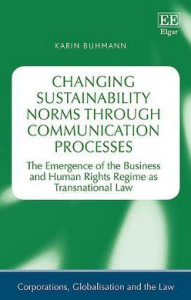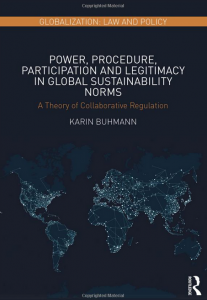Two newly published CBS-authored books look at how public-private collaboration can bring sustainability norms into existence and offer recommendations for civil society, business, regulators and academics. Based on research on the discursive evolution of the Business & Human Rights regime and taking an interdisciplinary social science approach, both volumes target broad audiences of sustainability-concerned practitioners and academics across the social sciences.
Read on to learn about the background (urgency for sustainability-concerned stakeholder to have knowledge on processes to develop norms of conduct for transnational economic operations) and insights offered by the books in regard to argumentative strategies for advancing new sustainability norms and their acceptance; and procedural organisation to balance power disparities and avoid capture of the negotiation processes. Titles and details for ordering can be found at the end of this post (with discount offers).
The urgency
What does a Tesla in space have in common with conflict minerals or labour abuse in the garment supply chain? The question may look like a new school children’s riddle. In fact, it is a strong reminder of the urgency to consider how public and private organisations can collaborate to develop norms of responsible conduct, especially in areas marked by governance gaps; how such processes can avoid capture by particular interests; and what communicative strategies actors can deploy to advance the acceptance of new norms across functions and interests.
When Elon Musk earlier in February 2018 successfully launched a space rocket that carried a Tesla headed for Mars (although in missing that target it was less successful), the project was heralded as a break-through in private space exploration. Some have described Musk’s idea of colonizing Mars as a ground-breaking response to the Earth’s depletion of resources and space (!) for an ever-growing human population. Others have lamented the quest for extra-terrestrial resources, and called for humanity to solve problems on this planet before moving on to (as it has been put: wreck) other planets and their eco-systems. Some have been raising warning signs in regard to private exploration of resources in space at the backdrop of an absent or at best immature Earth-ly system for governance of earthlings’ interests and desires in extra-terrestrial resources, whether explored and potentially exploited by private or public actors.
Unfortunately, issues of territory and governance gaps are not limited to outer space. They are very much a fact of life on Earth. They are the cause of many of the social and environmental sustainability concerns that keep media, corporate watchdogs and CSR consultants busy. They are also the causes of tragedies like the 2013 collapse of the Rana Plaza building in Dhaka, Bangladesh, which killed more than 1000 workers employed in garment factories in the building, and injured more than 2000.
Governance Gaps – not only a matter of state weakness
Governance gaps caused by limited territorial jurisdiction of companies’ home states and limited political will to adopt international rules setting a level playing field for companies without freezing the bar at low levels are also at least partial reasons for abuse of workers in numerous other factories, mines, quarries, infrastructure or agri-industry projects or in the informal industry that form part of global value chains, typically supplying goods made in low-wage countries to buyers or retailers in higher-wage countries. These problems have been argued to be due to states (in capacity of governance phenomena) being absent, weak or ineffective. Academics have been debating so-called political CSR, arguing for private enterprises to fill gaps left by ineffective nation states. However, the reason for governance gaps is not only state weakness. Jurisdictional limitations on states’ powers to regulate and enforce rules outside their territory is also part of the reason, shared by nations across the world and exacerbated by disagreement and lack of political will at the international governance level to adopt international rules pertaining to business.
The issue of nation state jurisdiction and territory can be compared to tedious situations in everyday life that are annoying but hard to change: If your neighbour plays music that you do not like in his or her home, you are not allowed, to access that home and turn down the volume. Unless, of course, the neighbour invites you to do so, or a prior agreement has been put in place. Similarly, you probably would not be pleased if your neighbour trespassed your property to turn off your music. Instead, the solution is to communicate and to do so in a manner that will – hopefully – drive change with your neighbour. Governance of transnational business activity largely depends on similar action, at least until governments agree to adopt and accept strong national rules with extraterritorial application, and/or international rules that apply to business. And as long as Earth’s governments do not agree on such rules for earthlings’ activities beyond our planet, this goes for exploration and exploitation of outer space too.
Beyond CSR guidelines, reporting and codes of conduct
Global sustainability concerns go beyond climate change, often related to economic practices with social and environmental impacts. Excessive natural resource exploitation, land grabbing and sub-standard labour conditions in global supply chains are frequent occurrences that also have high sustainability relevance. Such practices pose risks to the environment and human lives currently as well as in a longer term sustainability perspective of balancing current needs with those of the future. Investments and trade have caused depletion of large stretches of tropical forests, which not only harms the environment and adds to climate change, but also affects the socio-economic conditions of communities. The transnational character of these economic activities often involve or affect numerous private and public actors in several states or regions. This causes challenges for singular or even sector-wide private self-regulatory initiatives, and reduces the effectiveness of self-regulation by individual actors on their own. The enormity and encompassing character of global sustainability challenges have also drawn attention to the limitations of singular initiatives like private or sectoral Corporate Social Responsibility (CSR) guidelines, reporting schemes and codes of conduct. Hence, broadly applicable multi-stakeholder-created sustainability governance schemes have emerged to fill gaps left by public as well as private governance.
Breakthroughs in global sustainability governance
The UN Global Compact with its ten principles in the four issue areas of human rights, working standards, environment and anti-corruption, is a prominent example. Yet like the Paris Climate Change Accord offers a general normative framework but leaves much to further detailing of implementation. The UN ‘Protect, Respect and Remedy’ Framework and Guiding Principles on Business and Human Rights (UNGPs) offer more detailed guidance that has inspired several other transnational business governance instruments even beyond human rights, thus influencing the evolution of CSR norms and governance in a broader sense (Buhmann 2016, 2015). All these instruments were firsts within their fields, and broke previous stalemates. What causes such breakthrough? How can organisations concerned with sustainability engage with a regulatory process to advance substantive outputs? Understanding this can have far-reaching impacts for future public, private and hybrid governance of sustainability, locally, globally and beyond, and whether private, public or hybrid.
Norms of conduct: the road to the product is as important as the product
When we think of normative directives for private or public organisations for actions that conform with global sustainability needs, the focus is often on the substantive content of the rule as such: in other words, what are organisations encouraged or required to do? However, the road that leads to that substantive content of a rule is a condition for what ends up in the rule, whether soft (guiding) or hard (binding). It is therefore crucial to understand what makes some processes progress and deliver results, whereas others stall.
Across the globe, organisations of many types encounter difficulty in adequately meeting environmental and social sustainability challenges. The diversity of processes and outcomes calls for insights on what drives and impedes processes of clarifying what constitutes acceptable conduct. There is a particular need for knowledge on what makes for effective processes for defining norms for such conduct, and for the norms to become accepted with a view to integrate into organisational practice.
The field of business responsibilities for their societal impacts is marked by a diversity of interests that are often not aligned, even within a sector: those of different business organisations and sectors, different civil society organisations with diverse focus issues, and various national or local governments with diverging interests. As result, developing norms of conduct becomes a process of negotiation in which participants often have regard to what is in their own interests. The bumpy road to the 2015 Paris Climate Change Accord is a case in point, but not unique. The evolution of international normative guidance for businesses in regard to human rights leading to agreement on the 2008 UN Framework and 2011 Guiding Principles on Business and Human Rights have received less attention and acclaim outside human rights circles, but the processes to those results represent important innovation too and potential lessons for future collaborative regulation.
Studies suggest that while some initiatives to develop norms of conduct for responsible business conduct get weakened in the process, typically as a result of lobbying by certain organisations (Kinderman 2013; Fairbrass 2011; Buhmann 2011), in other cases the key to a strong or weak result is in the capacity of actors at making the effective argument, and linking up with the right partners for that purpose (Hajer 1995; Kolk 2001[1], Arts 2001[2]).
How are norms on sustainability issues negotiated?
At this backdrop, it is highly necessary to understand how norms on sustainability issues are negotiated and how stalemates that mark many such efforts can be broken. Two new books by CBS professor Karin Buhmann deal with this issue, both drawing on the evolution of the emergent regime on business responsibilities for human rights. Of the two monographs, Changing sustainability norms through communicative processes: the emergence of the Business & Human Rights regime as transnational law (Edward Elgar 2017) undertakes an analysis of the discourse that marked the construction of detailed normative guidance for businesses and states in regard to business responsibilities on human rights. It analyses communicative and argumentative dynamics that allowed the multi-stakeholder process launched by the UN to break previous stalemates in several settings, as well as dynamics that caused previous initiatives to fail. It finds that the ability to address other actors in terms that directly speak to their rationality and interests holds big potential for obtaining significant influence on the details of the normative outcome, and its acceptance. The book offers a theoretical explanation of this, and expands the analysis through findings and explanations on how actors in multi-stakeholder regulatory processes may strategically play on the interest of other actors in change and in preserving their interests. It offers insights on argumentative strategies that can be applied by civil society, CSR- and sustainability-committed companies, regulators or others to advance the acceptance of new norms on sustainability with other actor
Collaborative regulation for balancing of power disparities
In recognition that where negotiations take place on issues marked by highly divergent interests and issues of power, legitimacy of the process and output are significant for a normative outcome to be meaningful, the other monograph, Power, Procedure, Participation and Legitimacy in Global Sustainability Regulation: a theory of Collaborative Regulation (Routledge 2017) offers a theory-based proposal for collaborative regulation that takes account of power disparities and continuously manages these. The analysis combines empirical experience on public-private regulation of global sustainability concerns and theoretical perspectives on transnational regulation to offer a new theoretical approach to guide multi-stakeholder negotiations. It sets out detailed suggestions for the organization of multi-stakeholder processes to regulate sustainability issues to avoid capture and ensure the legitimacy of the regulatory process as well as the outcome of that process. In a global legal and political order, in which the private sector is increasingly replacing the public in terms of power and privilege but lacks the democratic legitimacy of the state and international organisations, such issues are of global as well as regional or local pertinence.
By addressing the same overall topic of developing sustainability norm and empirical cases to inform the analysis, the books develop synergy through two separate analyses that are mutually complementary. Both volumes apply theoretical perspectives from organisational and communication studies, political science and sociology to enrich the socio-legal analysis of regulatory strategies and innovative transnational law-making. This makes the volumes speak to the broad audiences that are engaged in the development of sustainability norms in practice and theory.
Focusing on the processes for developing norms of conduct, the analyses leave assessments of the uptake and effectiveness of such norms in organisations to future studies.
Titles and publisher details

Karin Buhmann (2017) Changing sustainability norms through communicative processes: the emergence of the Business & Human Rights regime as transnational law Edward Elgar Publishers (Globalization, Corporations and the Law). 416 pages. Order here; 35 % discount code valid through March 2018: VIP35.

Karin Buhmann (2017) Power, Procedure, Participation and Legitimacy in Global Sustainability Regulation: a theory of Collaborative Regulation. Routledge/Taylor & Francis Publishers (Globalization: Law and Policy). 200 pages. Hardcover and e-book available here.
Karin Buhmann is Professor with special responsibilities for Business and Human Rights. She is employed at the Department of Management, Society and Communication (MSC) at Copenhagen Business School (CBS). She currently serves as the interim Academic Director of the cbsCSR (CBS Center for Corporate Social Responsibility) and CBS Sustainability.
[1] Kolk, A. (2001) Multinational enterprises and international climate policy. In Arts, Bas, Math Noortmann and Bob Reinalda (eds) Non-state actors in international relations, Hants: Ashgate: 211-225.
[2] Arts, B. (2001) The impact of environmental NGOs in international conventions. In B. Arts, M. Noortmann and B. Reinalda (eds). Non-state actors in international relations, Hants: Ashgate: 195-210.
Pic by David Watkis, Unsplash.
